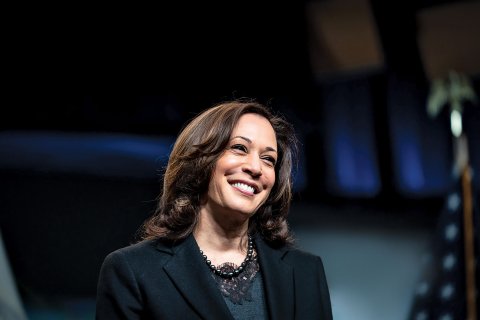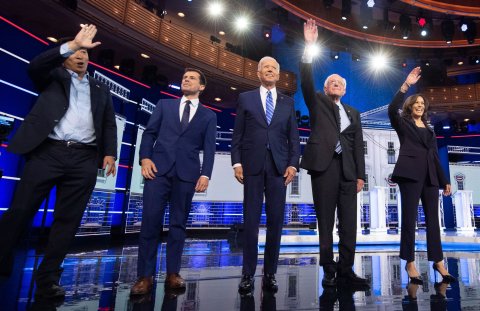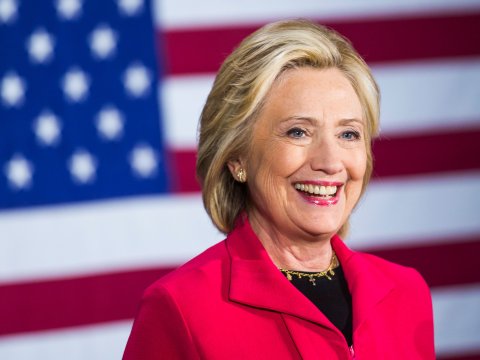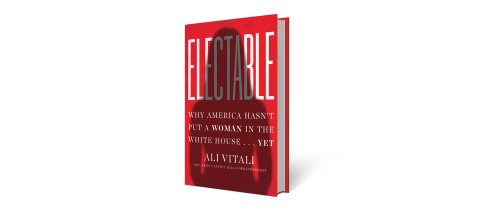In the 2020 U.S. election, six women ran for president. The winner was a white man. In all the years of presidential elections, only one woman has made it onto the ticket for a major party presidential nominee—Hillary Clinton in 2016. But why? What are the invisible—and very present—barriers preventing the election of the first female president of the United States? In her new book, Electable: Why America Hasn't Put a Woman in the White House...Yet (Dey Street Books, August), NBC News Congressional Correspondent Ali Vitali investigates the double standards and limitations that keep women politicians from being judged purely on merit. She asks what will make a candidate electable. In this excerpt from her book, Vitali discusses Kamala Harris' attack on Joe Biden at the June 2019 Democratic presidential primary debate—how a strong showing on the stage turned into a debate of her character and motives, and ultimately became a drawback. But would the same analysis have occurred for a male candidate?

South Bend, Indiana, mayor Pete Buttigieg was halfway through a well-worn, un-newsy answer to the moderator's question on race when Senator Kamala Harris saw the makings of a moment on the first Democratic debate stage in Miami in June of 2019.
"As the only Black person on stage, I would like to speak on the issue of race," she said. Conversations about systemic racism were not new in the Democratic primary, even at this early point. But those conversations had never put Joe Biden in the crosshairs before. "I'm gonna now direct this at Vice President Biden."
Biden looked up, expectant, and wholly unprepared for what came next.
"I do not believe you are a racist." She trained her eyes on him and softened her voice slightly for this disclaimer. "And I agree with you when you commit yourself to the importance of finding common ground. But I also believe—and it's personal." Her tone hardened. "It was hurtful to hear you talk about the reputations of two United States senators who built their reputations and career on the segregation of race in this country."
She was referring to comments that already had Biden in hot water. At a recent fundraiser he'd talked about working with two segregationist senators during his early years as a senator, making a point about a foregone time where progress could be made even in the face of fundamentally opposing viewpoints. "At least there was some civility," Biden reminisced during the gathering at a swanky New York City hotel. "We got things done. We didn't agree on much of anything. We got things done, we got it finished. But today, you look at the other side and you're the enemy. Not the opposition; the enemy. We don't talk to each other anymore."
"And it was not only that," Harris said on the debate stage, "but you also worked with them to oppose busing." A split-screen shot showed Biden's blue eyes looking straight ahead, a forlorn look affixed to his face while Harris leveled her full practiced-prosecutor's power at him. "There was a little girl in California who was part of the second class to integrate the public school and she was bussed to school every day. And that little girl was me. So, I will tell you that on this subject it cannot be an intellectual debate among Democrats."
While the crowd cheered, the moderator offered Biden the chance to respond. His lips were pressed together, a thin line between them sloping downward from left to right. As the moment unfolded on the debate stage—Biden calling Harris' comments "a mischaracterization of my position across the board"—her campaign's digital arm mobilized, seeking to capture the moment's virality online, as all digital teams set out to do on nights like these. They attached a picture of an elementary-school-aged Kamala and quoted their boss: "There was a little girl in California who was bussed to school. That little girl was me. #DemDebate" A similar meme was posted to Instagram. T-shirts with a young Harris' face on them retailed for $29.99 on the campaign's website, spurring conspiracy theories about whether this was all some elaborate plot to cash in at the expense of the front-runner (which even years later, Harris aides vow it was not).

In the spin room in Miami, most of our NBC News political coverage team had their eyes on 24-year-old Deepa Shivaram. The former Meet the Press associate producer had the job as the Harris embed, chronicling every word, attending every event and effectively becoming a walking encyclopedia of Kamala Harris knowledge. Where the hell did that come from? our prying eyes seemed to ask her as if she had access to the candidate's inner monologue. When the debate was over and the damage done, a colleague went up to Deepa and half-joked, half-informed her: "You're covering the next president of the United States."
And in that moment—based on what she'd just watched and what everyone around her was now saying—Deepa may have thought so, too. Pundits picked apart Harris' performance as strong, while footnoting that it was also filled with potential problems, including coming at Biden in a way that risked seeming more personal than political. Overall, though, a strong showing.
This was the start of a surge, one that made good on the promise that many believed: that Harris was a top-tier contender. On the stage, she'd begun to fulfill the excited expectations about her candidacy that sprouted from her profile in the Senate, access to donor networks, and relatively high national name recognition (compared to most others in the field).
Show of Strength or Opportunism?
Harris was rising now in Miami to meet the potential that media and political onlookers saw in her—and she was doing it by taking a big, confident swing at the front-runner.
But it was about more than dinging Biden. Democrats, if they allowed themselves to dream this dream, didn't just want to pick a candidate who could beat Trump; they sort of wanted someone who would pulverize him in the process. If Harris could do this to a Democrat, the thinking went after the first debate, imagine what she'd do to the president!
And so, Harris went from one to watch in a massive field of could-be presidents to the one to watch out for. Three polls—two national and one in Iowa—of likely Democratic voters done right after the debate showed her gaining steam and cutting into Biden's lead, although one in five polled still said the former VP was their first choice to be the party's nominee come November.
But when it came to Harris, Biden's political allies weren't the only ones chafed by the attack. It had also offended voters, creating a backlash from Democrats who felt she'd crossed a line attacking the field's Man to Beat so ruthlessly and on a seemingly random issue that had been outside the mainstream of national elections since the 1980s. What at first manifested as a show of strength then seemed overly personal and opportunistic. Deepa was seeing minds change in real time in her text chains with voters due to both Harris' waffling and the dust settling around the moment itself.
"In the moment, I thought Kamala's interaction with Biden was on point," Heather, a woman Deepa met during a campaign swing through California, said in a text. "But then I started to think about it and realized it kind of felt like a setup, a bit planned possibly." Which, of course, most attacks on the debate stage are.
There was a great, perhaps initially undervalued, store of trust and street cred for Biden. For Harris, that abiding affection—especially among this critical Black voting bloc—made her debate-stage barb a big problem. While some of the women surveyed (Buttigieg's campaign commissioned a survey of Black voters ages 25 to 65 years old in South Carolina) gave "plaudits for her passion" and some men recognized it as a potentially smart political strategy, many of the South Carolina voters felt it was "below the belt" on an issue that, especially to younger members of the electorate, was obscure. That was the bad news. The other bad news was that pollsters described the group's reaction to Kamala's own presidential candidacy as "muted." And those who could see her in the White House pictured her sitting in another office other than the Oval.
"She will make an absolutely great VP," one woman in the focus group said. A lovely sentiment, except that right now she was running to be the president, not the vice.
The Harris team's social media steps to amplify the "that little girl was me" moment had also taken on a narrative of its own in the weeks after the first debate. That they had the photo of Harris as a young girl at the ready somehow became proof of just how far Harris would go to win. It was painted as a highly coordinated assault—by the debate stage, then by social media to take Biden down while elevating the California senator. The resulting picture was one where Harris seemed politically opportunistic.
In that assessment there is both the possibility that that's true—good politicians rise by making the most of political opportunities to get ahead—but also something innately unfair, in that it pretends Harris was the only one doing it. Politics tends to swat back, instead of reward, women who openly politick and make power plays. That's what this was, at its core: a power play to knock the front-runner and show that Harris was a legitimate force to be reckoned with.
There is a tendency from media and voters alike to recoil from, or paint as somehow sinister, those kinds of moves from female politicians more than male ones. That these women are impatient and unwilling to wait their turn. That they are too confident or too willing to be aggressive. That's part of what happened here. Harris never walked back her decision to go after Biden in this way, simply telling people who brought it up that "it was a debate." Debate stages are made for contrasting, differentiating and, well, debating.
The Elephant in the Room
Harris' debate surge turned out to be more of a sugar rush than a sustained high. A national audience witnessed the prosecutor's steely gaze and prepared attacks; the same type they'd seen and largely celebrated during her time in the Senate grilling Trump's first attorney general, Jeff Sessions, and later, Supreme Court nominee Brett Kavanaugh. Some people wanted more. Some grappled with a new skepticism creeping in. A narrative lingered that the Harris team wished had not: that Kamala Harris wanted to be president so badly that she'd do anything, even target her friends, to win.
Whether it was a function of her gender, her race, or both, "consciously or not, on Twitter and in the press, [many] would suspect her motives more than they did with others," one former Harris aide told me. "Just dodging a question, as every politician does every day of their lives, if Mayor Pete does it, he's still on message, he's sticking to his talking points, he's a genius. If she does it, it's 'what is she hiding?'"
She also eventually, and perhaps too late in the game, began taking on the issue of electability and the sexism and racism that were inherent in informing who could be electable and who couldn't. "I have also started to, perhaps, be more candid," she said in an October 2019 interview with Axios, "talking about what I describe and believe to be the elephant in the room of my campaign—electability. Essentially is America ready for a woman and woman of color to be president of the United States?"
She went on: "There is a lack of ability, or difficulty in imagining that someone who we have never seen can do a job that has been done 45 times by someone who is not that person...I'm aware of the challenges, but I know who the people are. And I know that we have an ability to see what can be."
Ultimately, that would be true—just not the way Harris initially imagined it.
Dollars and Cents
Harris' departure from the race in December 2019 spurred a brief discussion on the barriers faced by women and women of color on the fundraising circuit, given that she cited lack of funds as a key reason to drop out. Ability to raise money is a critical metric—considered a predictor for electoral success, especially in presidential races that require millions to even get a viable campaign infrastructure off the ground. Raising cash is a barrier that women have long faced to becoming successful candidates, in part because the donor class tends to be male, and biases of viability could stem from never having seen a woman, or woman of color, consistently succeed in the presidential space before. In an arena that's all about return on investment and backing a winning horse, it can take extra convincing for candidates that don't automatically conjure the image of POTUS.
Still, when she joined the Biden ticket in the summer of 2020, gone was any worry about Kamala's fundraising ability. In fact, as one Politico headline crooned after she'd been tapped as VP: "Harris sets off Democratic donor stampede." And in August, the Biden-Harris ticket got more than $33.4 million from women—double what the campaign had raised from female donors the month before, CNN and the Center for Responsive Politics found. While it's hard to quantify the specific impact of running mates, Harris' presence on the ticket made dollars and cents. Her power was felt in 2020—but mostly when she was elevated, as opposed to seeking an election in her own right.

Lessons Learned
But to others in the Democratic apparatus, race and gender told only part of the story. "It was an unbelievably bad campaign," an operative who sat out the primaries told me plainly, echoing the analysis of most Democrats who closely watched Harris in 2020.
The silver lining, though, for those with hopes for Harris in the future is that many of the things that felled her in '20 could also be chalked up to her being a first-time candidate, new to the national stage. "Kamala will learn from this," this person said, citing the more clear-eyed campaign Hillary Clinton ran in 2016 after losing in the primaries in 2008. "There's no better way to learn than actually to get your feet wet and go through the process."
Ultimately, though, Harris would leave the race and then reemerge. When she did, the biggest question her campaign left behind—who is Kamala Harris?—would be answered clearly for voters. Not necessarily by her, but by the man who chose her to run alongside him.

Excerpt adapted from Electable: Why America Hasn't Put a Woman in the White House...Yet by Ali Vitali, published by Dey Street Books.














